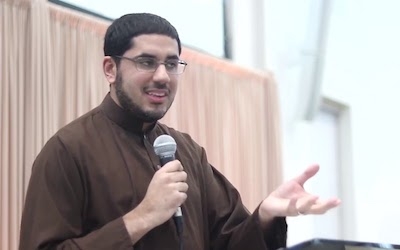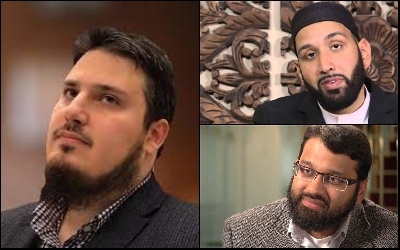By Jason Bellini
March 17, 2022
A restaurant and microbrewery has become a safe house for Ukraine's LGBTQ population.
A narrow hallway, a stairway and a sanctuary. This is Denys Kratt’s home away from home.
Kratt left eastern Ukraine just before the Russians destroyed his apartment building.
This is more than a refuge. It’s a safe house for people like Kratt and his boyfriend and a number of their friends who can’t go because of the restrictions on men leaving Ukraine — and who can’t fathom the idea of living under Russian occupation.
In happier times — really, just a few weeks ago — this was a place of celebration. A restaurant, microbrewery and stage for shows and celebrations of life events. Kratt managed marketing for the company’s Kharkiv location. Those marketing skills are going to good use here: He's pitching this place on social media to friends, friends of friends and total strangers in need of shelter or donated clothes, food and medicine.
When Newsy visited Kratt last Saturday, he and Polish volunteers were frantically organizing vans to help people get out of here to Poland.
Vadyn Savescu is from Dnipro, a city in eastern Ukraine that's been hard hit by Russian airstrikes, like the one last week that hit near a kindergarten. Savescu says he was forced to consider the possibility he'd be living under Russian occupation.
VADYN SAVESCU: Since I'm a member of the LGBTQ community, I know that we are kind of first to be dealt with by the Russians because we are like enemies of [president Vladimir Putin's] system, of his ideology.
NEWSY'S JASON BELLINI: You think they would go after gay people?
SAVESCU: Yes. Yes. If there is no proper police force and no rule of law, just Russian occupation troops, some people would just go after us.
Gay rights groups have established a number of small safe houses in Lviv.
"We try to provide them with place where they can get food, clothes, sleep," said Tymor Levhuk, executive director of Fulcrum UA.
This shelter, which is in an old dive bar, is getting ready to open up for 18 people, exclusively men and transgender people. The reason being that women, lesbians, are being encouraged by LGBTQ leaders here to leave the country.
Marina Hertz and her girlfriend — allowed to leave because they are women — are getting help from Denys Kratt to get to Poland.
Savescu hoped, on Saturday, he would be allowed to get there as well because he has a documented, chronic medical condition. We found out later he successfully made it out of the country.
for Kratt, that’s not an option. Right now he considers Lviv to be safe. But he fears, if Russians were to gain full control over Ukraine, what would become of his country, his community, and himself.
KRATT: It's a very dangerous mix for me, being [an] activist for LGBTQ and activist for Ukraine. It's so dangerous for me being under the Russian occupation.
BELLINI: Do the Russians know who you are?
KRATT: Yes, of course.
BELLINI: They know who you are?
KRATT: I know it. Yes.
He knows they know Zhanna Simeiz. His drag character made headlines at Kyiv’s 2017 gay pride when he — she — said that once Ukraine liberates Crimea from Russian occupation, pride would be celebrated there. Or, as Russian state media put it, "Kiev transvestites scare Crimea” ... ”threaten Crimea.”
Kratt says that before Russia came in, gay people were out there.
KRATT: People from all over the world, from all [Ukraine], from Russia, [from] international countries, come to relax.
BELLINI: But after 2014 no more?
KRATT: No more.
Kratt maintains a sense of humor about his situation. Entertaining, if Ukraine wins the war, ideas of the party they’ll throw.
American Islamists Split over Sexual-Identity Issues
Originally published under the title "Islamist Partnership with LGBT Groups Is 'Heresy'."
 Islamist commentator Mobeen Vaid argued that support for LGBT rights by some Muslim leaders "sets the stage for heresy, apostasy, untold spiritual crises, and communal demoralization" in a recent, widely shared essay. |
In a widely shared essay published on Muslim Matters, Islamist commentator Mobeen Vaid has laid out what appears to be the most comprehensive Islamist argument yet for why Muslims should oppose LGBT rights.
"Religions in the West," Vaid warns, "...have largely collapsed at the altar of homosexuality and are quickly proving incapable of resisting transgenderism too."
The question of whether or not to support the LGBT movement has increasingly divided not just the Muslim community, but American Islamism as well – as some Islamists seek to utilize progressivist activism to help advance their own agendas, while other, ostensibly more purist voices, denounce what they regard as acts that compromise Islamic morals.
 Popular online preacher Daniel Haqiqatjou (left) has repeatedly attacked Islamist clerics such as Omar Suleiman (top right) and Yasir Qadhi (bottom right) for their perceived support of LGBT rights. |
Over the past few years, for instance, leading Islamist clerics such as Omar Suleiman and Yasir Qadhi have been repeatedly accused by the popular online preacher, hardline Islamist Daniel Haqiqatjou, of letting the Muslim community "[suffer] from this LGBT assault" while they "benefit handsomely by being in the good graces of the left wing." Meanwhile, Islamist thinktanks such as Suleiman's Yaqeen, have been attacked by Haqiqatjou's collaborators for their perceived support of LGBT rights.
Progressivist Muslim groups are also under attack. Vaid reserves particular ire for Muslim Advocates, which he claims has "supported a wide range of LGBT rights," even "praising a Muslim drag queen as 'living her [sic] truth'" [sic inserted by Vaid].
High profile Muslim organizations with Islamist histories are in Vaid's sights. He points out that the annual conference of the Muslim Public Affairs Council (MPAC) featured lesbian TV actress and producer Fawzia Mirza. The fact that these organizations supporting LGBT rights, for the most part, claim to be zakat-eligible, has further angered Islamists.
Vaid's argument has four main points: Muslim political advocacy for LGBT rights is "fundamentally immoral" and "inimical" to Islamic ethics; the political rationales for such activism offered by his ideological opponents are unconvincing; the Muslim community's ambivalence is making it easier for the "LGBT" persons to prey on young Muslims already struggling to negotiate their identity; and not taking a firm stance against issues such as homosexuality will "only deepen" the theological crises within the Muslim community.
Vaid calls the LGBT movement a "colonial tool of global oppression, domestic coercion, and social domination." |
Not limiting himself to the domestic context, Vaid also cites Western condemnation of Hamas's violence against homosexuals as purported evidence that the LGBT movement is a "colonial tool of global oppression, domestic coercion, and social domination."
But Vaid appears most concerned by the "decision of some Muslim leaders and activists to do and to say nothing meaningful on the LGBT question—or, worse, to actually support the movement—" which, according to him, "sets the stage for heresy, apostasy, untold spiritual crises, and communal demoralization."
Martha Lee is the research fellow for Islamist Watch, a project of the Middle East Forum.
No comments:
Post a Comment